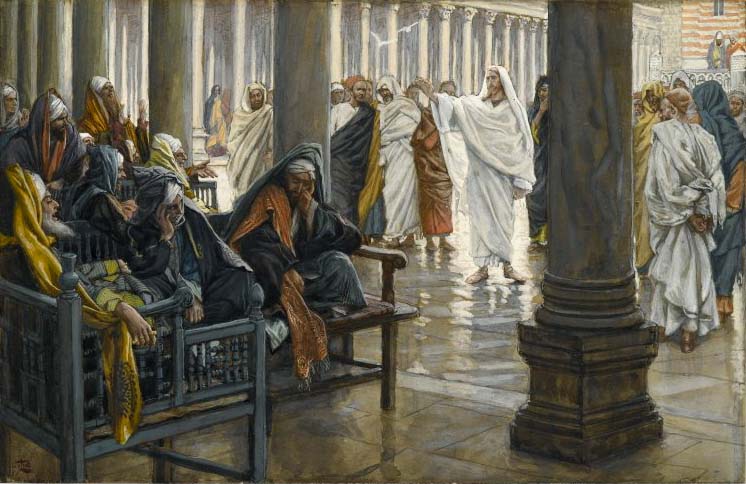Jesus and Historical Revisionism
Indignation over monuments to historical figures is beginning to turn into a kind of blind hysteria. In America, the Confederate dead, former Supreme Court justices, Christopher Columbus, and even the 19th-century physician known as the “father of gynecology” are all in the crosshairs. In Germany, some have called for removing statues of Martin Luther because of his anti-Semitism. Implicit in all this is a certain naiveté and presumption: if we had been around back then, we would not have committed those offenses. Jesus’ words to the scribes and Pharisees, however, is a remedy for that kind of self-righteous, simplistic thinking.
The scribes and Pharisees, the religious elite of first-century Judaism, believed themselves the heirs of righteous forefathers. Jesus speaks directly to this presumption:
Woe to you, scribes and Pharisees, hypocrites! for you build the tombs of the prophets and adorn the monuments of the righteous, saying, “If we had lived in the days of our fathers, we would not have taken part with them in shedding the blood of the prophets.” Thus you witness against yourselves, that you are sons of those who murdered the prophets. Fill up, then, the measure of your fathers. You serpents, you brood of vipers, how are you to escape being sentenced to hell? (Matt. 23:29-33)
The scribes and Pharisees, in self-righteousness, assert that if they had lived then, they would never have done such wicked deeds.
So it is with our own generation. We sit in judgment over past generations with an air of self-satisfaction about our current enlightened moment, clearly the most virtuous of all that preceded it. Previous generations – and certainly those responsible for the discovery, founding, and early preservation of our nation – were ignorant, superstitious, and immoral. We are scientific, realistic, and wise. We watch films about racial or social injustice like Selmaor 12 Years a Slave and rarely imagine ourselves to be just as capable of prejudice or moral evil.
The truth is that if we had been presented with the same challenges as our forefathers, most of us would probably have made the same errors. It is the natural human tendency to try to fit in with the group, to go with the flow, to conform, and to avoid risking persecution or ostracization. Few people in any generation take the right, proper moral imperative, precisely because the consequences are typically so dire. Those who do are rightly deemed saints by the Church. This is precisely why the prophets of the Old Testament were always in the minority against a sluggish, selfish majority.

Therefore I send you prophets and wise men and scribes, some of whom you will kill and crucify, and some you will scourge in your synagogues and persecute from town to town, that upon you may come all the righteous blood shed on earth, from the blood of innocent Abel to the blood of Zechari′ah the son of Barachi′ah, whom you murdered between the sanctuary and the altar. Truly, I say to you, all this will come upon this generation. (Matt. 23:34-36)
The more we reject an honest, just appraisal both of ourselves and our moment, the more likely we are to commit the same sort of injustice and wickedness we so vocally detest in others and in the past. Self-righteousness breeds an inability to see the truth about ourselves or our culture. Is it any wonder that the radical voices calling for the removal of every historical figure tinged with racism or sexism are essentially the same ones defending abortion and euthanasia?
Jesus ends this series of warnings with a lament over Jerusalem, in a tone less angry and accusatory than sorrowful:
O Jerusalem, Jerusalem, killing the prophets and stoning those who are sent to you! How often would I have gathered your children together as a hen gathers her brood under her wings, and you would not! Behold, your house is forsaken and desolate. For I tell you, you will not see me again, until you say, “Blessed is he who comes in the name of the Lord.” (Matt. 23: 37-39)
America – and the whole world – doesn’t need more self-righteous derision towards the figures of our past. We need honest introspection, repentance, and charity. Introspection and repentance for the evil parts not only of our past, but of our present. Charity that approaches our heritage, however flawed, with a bit more humility.
A people blind to an honest and charitable appraisal of their history – and God’s role in and through imperfect, sinful people – will surely be just as blind to His work in the present. Moreover, our current spell of tearing down monuments and renaming holidays – which is rapidly becoming a broader ideological movement – is ultimately more divisive than unifying and reconciling. As Jesus and our 16th president warned, a house that is divided against itself will not stand.
![]()
Casey Chalk
Casey Chalk is a writer living in Thailand, an editor for the ecumenical website Called to Communion, and a graduate student at the Notre Dame Graduate School of Theology at Christendom College. He has also written about the Pakistani asylum-seeker community in Bangkok for New Oxford Review and Ethika Politika.
EDITORS NOTE: The featured image is of the Richmond Police Memorial statue in Richmond, Va., which was vandalized Wednesday, July 12, 2016, with graffiti referring to Alton Sterling, who was killed by a police officer in Baton Rouge, La. Photo by Bob Brown/Richmond Times-Dispatch via AP. © 2017 The Catholic Thing. All rights reserved. For reprint rights, write to: info@frinstitute.org. The Catholic Thing is a forum for intelligent Catholic commentary. Opinions expressed by writers are solely their own.




Leave a Reply
Want to join the discussion?Feel free to contribute!